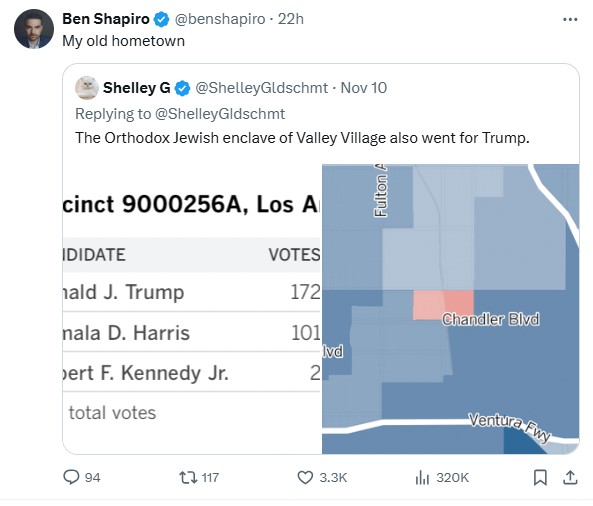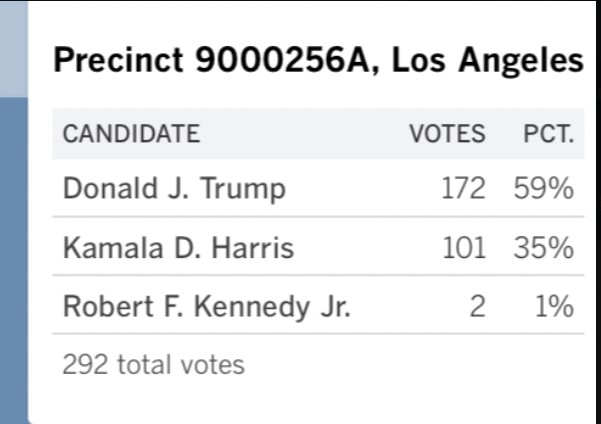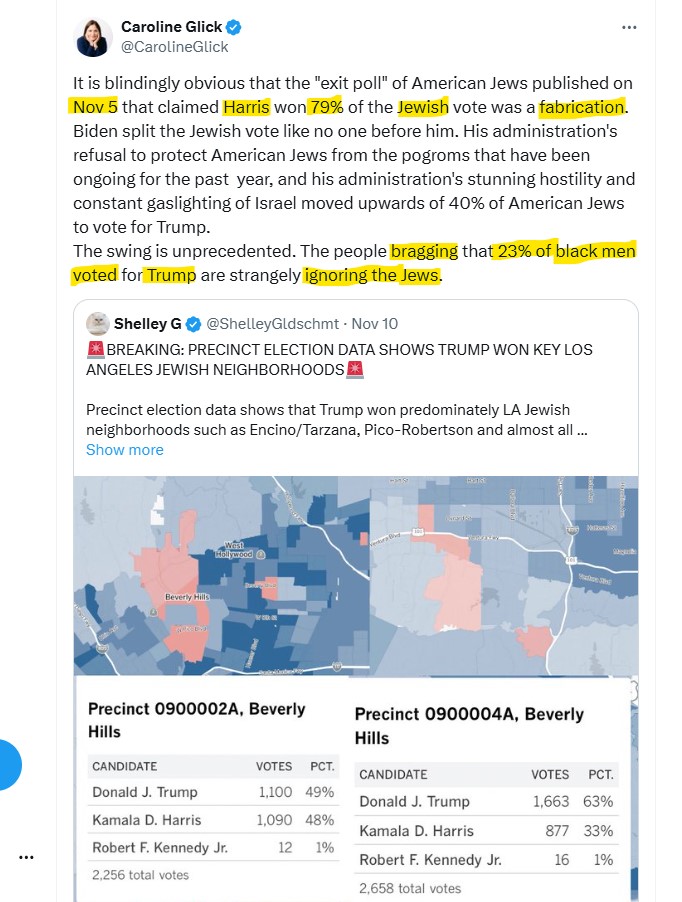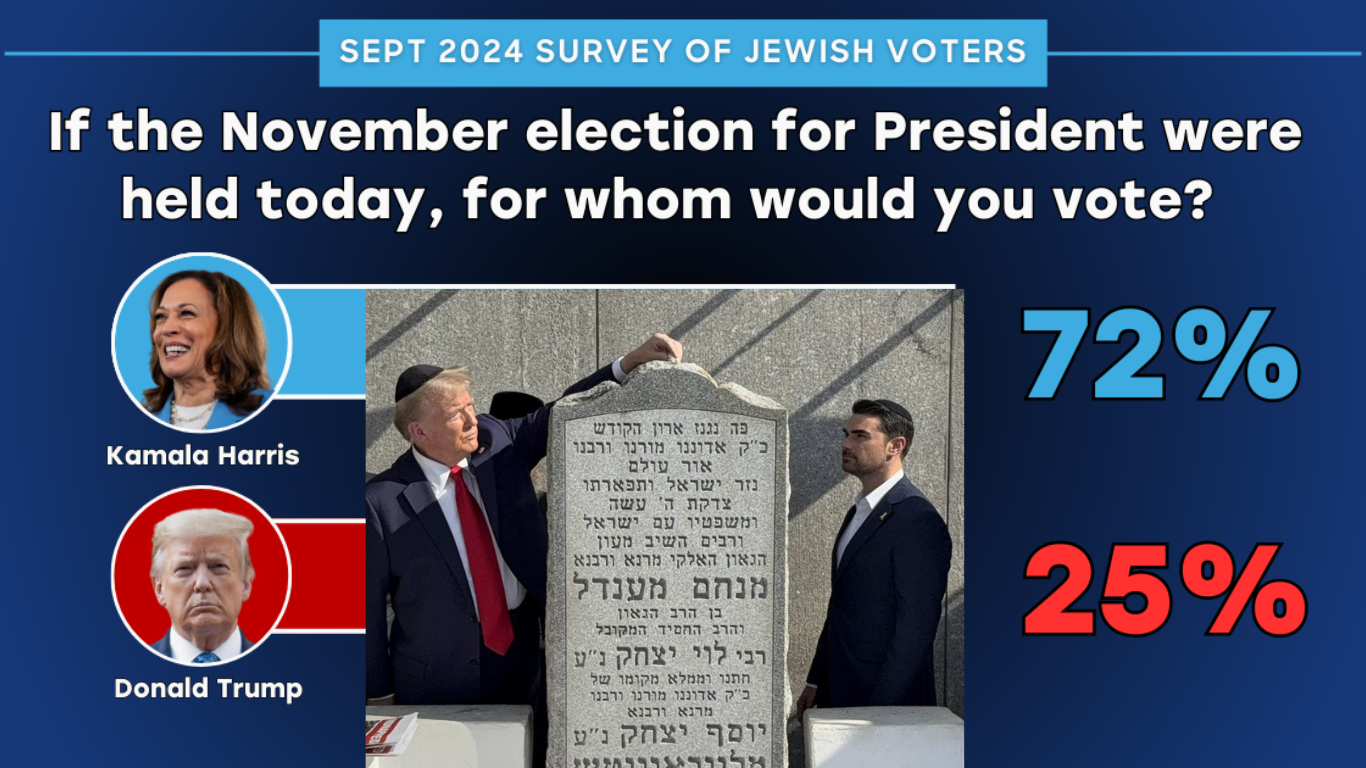Jewish Jihadists within the Republican Party are in a panic following Trump's victory on November 5th over Kamala Harris. The Jewish Jihadists within the GOP are scrambling to find a new Jewish vote tally to bolster their pitch to Donald Trump that he needs to take an even more pro-Israel stance, arguing that Jewish Americans overwhelmingly supported him. Funny how things have changed in just four years. Back in 2020, it was Trump pleading to "find 11,780 votes" in a call to Georgia’s Secretary of State, Brad Raffensperger, to overturn the state’s election results. Now, it's the Jewish Jihadists pressuring formerly “woke” precincts to find more pro-Trump votes to shift his negative perception of their community.
If you follow Ben Shapiro and other rabid Jewish Jihadists like Caroline Glick—a former adviser to Netanyahu and sister of former USAID deputy Bonnie Glick—on Twitter, you'll see their timelines suddenly filled with claims of a newly discovered Jewish vote tally from liberal cities like Los Angeles and New York City, supposedly showing majorities supporting Trump. This surge in data comes six days after the election, following frantic efforts by these Jewish Jihadists to change the post-election narrative that 70% of Jewish Americans voted for the Democratic candidate. The generally accepted consensus—without hard data, conveniently and for obvious reasons—has long been that Jewish Americans predominantly vote for Democrats, given their social and cultural leanings as liberal coastal elites. In previous elections, no one felt the need or interest to challenge this assumption because it wasn't politicized. Jewish voters were traditionally treated delicately and bipartisanly, with both the loser and victor expected to acknowledge them positively in concession or victory speeches. However, as with many things, Trump turned this delicate issue into a contentious partisan matter.
Throughout his campaign, Trump repeatedly called out Jews who vote for Democrats, suggesting they "need to have their heads examined." Initially dismissed as Trump simply being Trump—stringing together absurd comments to entertain his MAGA base—his rhetoric became sharper as Election Day approached and polls tightened. “If I lose,” Trump told an anxious crowd, it’s because of "the Jewish people.”
This statement shocked many, echoing pre-WWII rhetoric in Germany, as analysts and historians noted. Yet, surprisingly, it did not elicit the usual outcry from Jewish leaders (especially the ADL), the media, the White House, or Kamala’s campaign—despite their prior harsh condemnations of college students who critiqued Israel and Zionism, without even mentioning Jews. It was clear from the start that Jewish Jihadists found the comment objectionable but chose not to amplify it, expecting Trump to win and not wanting to antagonize him. From a moral standpoint, which antisemitism activists claim to uphold, this silence was appalling. Strategically, however, it was a clever move. Trump, known for being vindictive, rarely forgets those who attempt to silence him when he's angry, ranting, and raving. But it turns out he’s even less forgiving of those who don’t vote for him.

In his triumphant victory speech, Trump thanked nearly every demographic group in America—except Jews, a rare and unprecedented move in American politics. To add insult to injury, he thanked Muslims for their support, something no other winning candidate from either party had ever done. For Trump-aligned Jewish Jihadists like Ben Shapiro, being occasionally ignored is typical of Trump's style, but him praising Muslims instead of them is seen as a mortal threat to their grand narrative that Islam is not to be trusted. Their frustration was compounded when it emerged that one of Trump’s closest advisers, the key figure in mobilizing the Arab vote, is none other than Massad Boulos, the father-in-law of his daughter Tiffany. A Lebanese businessman, Boulos successfully persuaded disillusioned Arab and Muslim voters—upset with the Democratic Party over Gaza and Lebanon genocide policies—to support Trump. And support him they did. For the first time in history, Arab and Muslim voters, especially in Michigan, backed a Republican candidate over a Democrat, prompting Trump to publicly thank the community in his first speech as president-elect. However, for Boulos and his community, Trump’s kind words are welcomed but insufficient—they expect tangible actions in Lebanon and Gaza to halt the bloodshed.
Trump, who values loyalty above all, has already signaled that he will not forget the Muslim and Arab community’s contribution to his victory, both in policy and personnel decisions. On the policy front, he has already spoken to Palestinian President Mahmoud Abbas, promising to prioritize ending the Gaza conflict. On a personnel level, Boulos is expected to play a key role in shaping Trump’s foreign policy. The New York Times has already raised alarms about how much influence Boulos wields over Trump's foreign policy direction. In a further signal of his intentions, Trump excluded two of the Jewish community’s favorite allies, former Secretary of State Mike Pompeo and former UN Ambassador Nikki Haley, from serving in his administration. Both were loyal friends to Israel but were dismissed unceremoniously in a surprise announcement on Trump's Truth Social platform. This has left pro-Israel Jewish Jihadists within the MAGA camp scrambling to regain Trump’s favor.

After nearly a week of brainstorming, they appear to have settled on a new narrative: the majority of Jews actually voted for Trump, but the “liberal” media ignored their significance in favor of focusing on Latino and Muslim voters. Suddenly, charts are flooding Twitter, showing Jewish support in traditionally liberal cities swinging to Trump. Not only do these charts appear dubious, but their coordinated and viral dissemination seems designed to catch Trump’s attention.

This situation is a troubling sign for the pro-Israel hawks within the GOP and American politics in general but great news for those weary of America’s endless wars in the Middle East. However, it remains to be seen whether these last-ditch efforts to influence Trump’s stance on Israel will succeed in coaxing him back to his neoconservative leanings.
